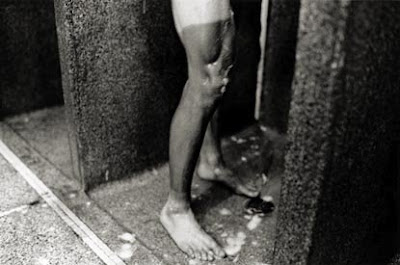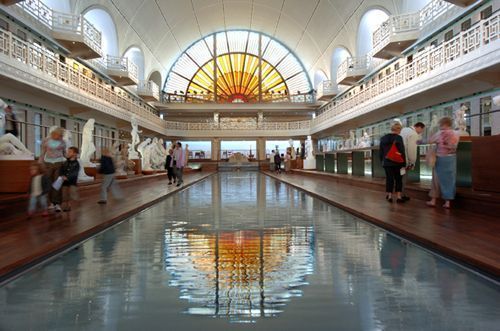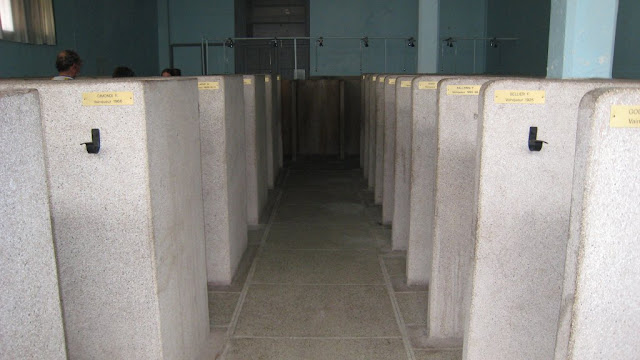
Paris-Roubaix must be the only race where the washing facilities make up part of the legend. The showers inside the velodrome are as much a part of the ritual as is the photo of the winner lifting the cobbled trophy in the air. Indeed can you name another sport where the showers or locker room is treated with the same reverence?
If you weren’t into cycling and from outside France, you’d probably never have heard of Roubaix. But maybe an artist would know of the town as it has an art gallery made from a converted swimming pool.

But if the town has lavished money on the old swimming baths to make a modern public space, the velodrome in Roubaix is neglected, a less than lavish water feature. The track is crumbling and as I wrote the other day a new track is being built. The showers, part of the same 1930s building, are no different. These are hard blocks of cement.
With the mud and dust from the finishes, the communal showers resemble a cow shed with milking stalls. The plumbing looks like it was installed by Heath Robinson or Rube Goldberg. You wonder if the water is even warm.
Why are these showers so important?
It’s hard to pin one reason. Obviously the riders need a good wash, this race throws up dirt like no other. But riders these days have team buses with onboard showers. No, for me there are three more factors.
- First up, to reach the showers is itself an achievement, it means you have finished the hardest one day race of the year. Only 74 riders merited a shower last year.
- Next the showers are a place of legend. Iconic images have been taken and each cubicle bears a brass plaque of the past winner. This is more than a washroom, it is a part-museum, part Elysium.
- Also this is a race where I find a lot of luck is involved. Those who lost out find a moment of calm to replay the race, to reflect on what happened, what they could have done differently. Above all what would have happened if they hadn’t punctured, if they’d taken the other side of the cobbled road. Few other races have such a coulda, woulda, shoulda aspect and the shower is the moment for a rider to lament when the race slipped, sometimes literally, away from them.

I’ll leave the last words, translated, to an anonymous Swiss journalist:
The showers are the only strategic place to get hold of a Paris-Roubaix rider. They all go there. And they dream of the place like a dog dreams of a bone. With time the communal showers have become a legend, as much as the cobbles. They are the wall of tears, the place where riders grimace, lament, compare injuries, describe their crashes… it’s the place where they wash dust, wounds and fatigue.

Short post but a damned good one.
…and it’s the mystique and folklore that makes cycling what it is…superb post again…..must be something about the Spring!!
Nice bit! Makes me want to pull out “A Sunday in Hell” and watch it yet again.
I like to think the riders in the showers are not only thinking of coulda, woulda, shoulda, but are already dreaming of winning next year – maybe I could of gone faster, maybe it didn’t hurt so much, maybe I’ll get more luck next time.
Crommy: oh yes. Cycling is like that, you can fail but soon make plans to come back and get it right. Experience does count for plenty.
It’s also probably one of the few chances riders get to shower down and reflect post-race in the company of riders from other teams. Whilst the teams are competing against each other, as you say – just finishing Roubaix is an accomplishment – and sharing that with any finisher regardless of the team must be something special.
I am the only woman who reads this blog (I don’t think so) – let’s face it, naked guys in the shower is HAWT!
Yes, the water is warm. For early finishers.
I agree with operarunner.
That said, I found this to be a surprisingly moving article, for all its brevity. The idea of the riders sharing their experiences from the day across teams is a wonderful symbol of cycling as a brotherhood (in the general, non-sexist sense).
I would love one day to see and photograph the famed showers, to capture some of the stark simplicity hinted at in the photo above.
And no, I wouldn’t object to doing so on race day. 😉 But let’s keep this in the realm of possibility, shall we?
Half the pieces from this site are worthy of a Pulitzer. Thank you.